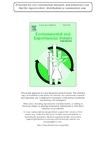Por favor, use este identificador para citar o enlazar este ítem:
http://www.alice.cnptia.embrapa.br/alice/handle/doc/902435| Título: | Drought tolerance and antioxidant enzymatic activity in transgenic 'Swingle' citrumelo plants over-accumulating proline. |
| Autor: | CAMPOS, M. K. F. de  CARVALHO, K. de   SOUZA, F. S. de   MARUR, C. J.   PEREIRA, L. F. P.   BESPALHOK FILHO, J. C.   VIEIRA, L. G. E.   |
| Afiliación: | INSTITUTO AGRONÔMICO DO PARANÁ INSTITUTO AGRONÔMICO DO PARANÁ INSTITUTO AGRONÔMICO DO PARANÁ INSTITUTO AGRONÔMICO DO PARANÁ LUIZ FILIPE PROTASIO PEREIRA, SAPC UNIVERSIDADE FEDERAL DO PARANÁ UNIVERSIDADE FEDERAL DO PARANÁ. |
| Año: | 2011 |
| Referencia: | Environmental and Experimental Botany, v.72, n. 2, p. 242-250, 2011. |
| Descripción: | In this study we investigated the effects of the high endogenous proline level on water relations, gas exchange and antioxidant enzymatic activity in leaves of transgenic 'Swingle' citrumelo rootstocks transformed with the P5CSF129A gene coding for the key-enzyme for proline synthesis, under water deficit. Leaf total water, osmotic and pressure potentials, stomatal conductance, photosynthetic rates and xylem sapflowwere evaluated in non-transformed control and transgenic plants during water deficit treatment. Malondialdehyde (MDA) content, catalase (CAT; EC 1.11.1.6), superoxide dismutase (SOD; EC 1.15.1.1) and ascorbate peroxidase (APX; EC 1.11.1.11) activities were quantified in leaves collected based on their total water potential, representing the following conditions: irrigated (w = -1.3 MPa), moderate stress (w = -2.3 to - 2.5 MPa), severe stress (w = -3.8 to - 3.9 MPa) and recovery (24 h after re-irrigation: w = -1.3 to - 1.9 MPa). Osmotic adjustment was observed in transgenic plants until 11 days after withholding water, while pressure potential in non-transformed controls was close to zero after nine days of water deprivation. This superior maintenance of turgor pressure in leaves of transgenic plants led to higher stomatal conductance, photosynthetic and transpiration rates when compared to non-transgenic plants. Drought caused a significant decrease in APX and SOD activities in control plants, followed by an increase after re-watering. On the other hand, CAT was more active in control than in transgenic plants under irrigated condition and both stress levels. Our results suggest that transgenic plants were able to cope with water deficit better than non-transformed controls since the high endogenous proline level acted not only by mediating osmotic adjustment, but also by contributing to gas exchange parameters and ameliorating deleterious effects of drought-induced oxidative stress. |
| NAL Thesaurus: | Drought tolerance Oxidative stress Proline |
| Palabras clave: | Citrus rootstock Osmotic adjustment |
| Tipo de Material: | Artigo de periódico |
| Acceso: | openAccess |
| Aparece en las colecciones: | Artigo em periódico indexado (SAPC)  |
Ficheros en este ítem:
| Fichero | Descripción | Tamaño | Formato | |
|---|---|---|---|---|
| Droughttoleranceandantioxidant.pdf | 497,36 kB | Adobe PDF |  Visualizar/Abrir |









